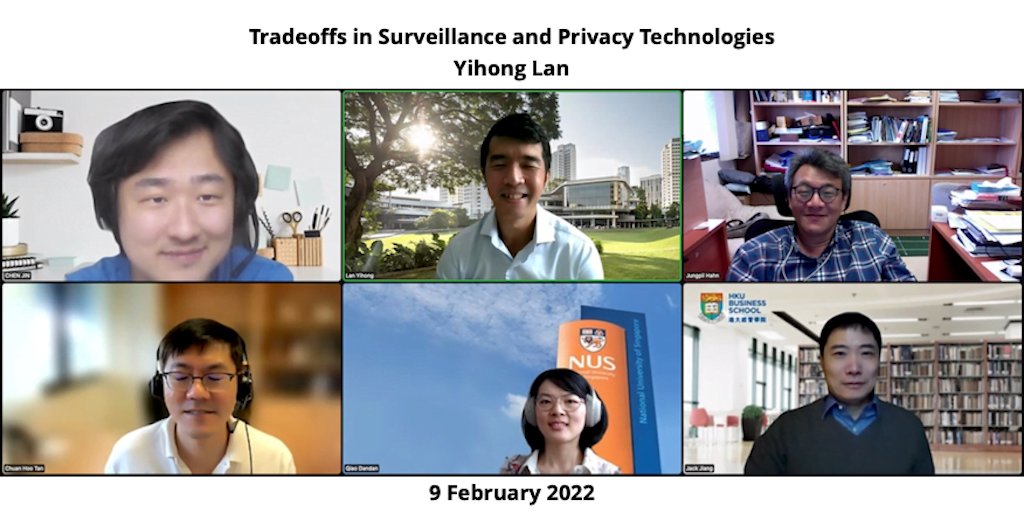
PhD Defense — Lan Yihong
Date/Time: February 9 (Wed), 2022 @ 10:00AM
Venue: Online via Zoom (https://nus-sg.zoom.us/j/81042382052?pwd=TDh1c1ZrVlhEN1oxOTNqaEtQN3FsUT09)
Dissertation Title: Tradeoffs in Surveillance and Privacy Technologies
Abstract:
One of the key growth areas in information technology that threatens privacy is the enhanced capacity for surveillance. Surveillance technologies pose a particularly salient threat to privacy since they allow the surveillant to observe that which a subject does not wish to be observed.
Proponents of surveillance technology have made the case for its implementation in various contexts, such as progress towards efficient administration of large-scale bureaucratic organizations, increased physical security of people and property, and the provision of deterrence and information to prevent terrorist acts. However, critics have claimed that surveillance technology is sweeping up massive amounts of data without evidence of the technologies being effective in improving security.
Hence, any implementation of surveillance technologies should carefully consider the benefits of surveillance technology (such as increased physical security and administrative efficiency) against potential risks (such as reduced personal privacy). Empirical studies conducted have been inconclusive with regards to how the tradeoff could be addressed to improve outcomes. Researchers found that respondents recognized the need for surveillance in general but raise concerns when surveillance might apply to them individually. The researchers noted that the resolution to this conflict was unclear. Other studies have found that ‘the public does not engage in trade-offs between the different (security and privacy) values involved, but rather, wants it all.’
This thesis seeks a resolution to the aforementioned conflict by empirically investigating the IT artifacts central to the privacy-surveillance tradeoff in terms of their effectiveness in achieving both surveillance and privacy objectives. In Study One, we investigate the impact of surveillance technology in the context of an unmanned retail environment. By investigating the impact of surveillance technology on consumer behavior outcomes such as theft rate, approach rate, and conversion rate, we hope to better understand if surveillance technologies live up to the promises of improving net economic outcomes by delivering better security. In Study Two, we examine the effect of privacy-preserving features on user behavior in the context of COVID-19 digital contact tracing. We consider the possibility of surveillance technologies that achieve their surveillance objectives while preserving the privacy of its users by investigating the impact of privacy-preserving designs on user behavior.
Taken together, these two studies aim to uncover if and how surveillance technology should be implemented, given its strong privacy implications. The findings of these two studies expand our understanding of the underlying mechanisms driving the privacy surveillance tradeoff and point to the need for theory-driven design guidelines for the development of future surveillance systems. As surveillance technologies become increasingly available and important in managing the growing challenges of society, further research in this direction could ensure that the advancement of surveillance technology does not proliferate into an information privacy threat.
